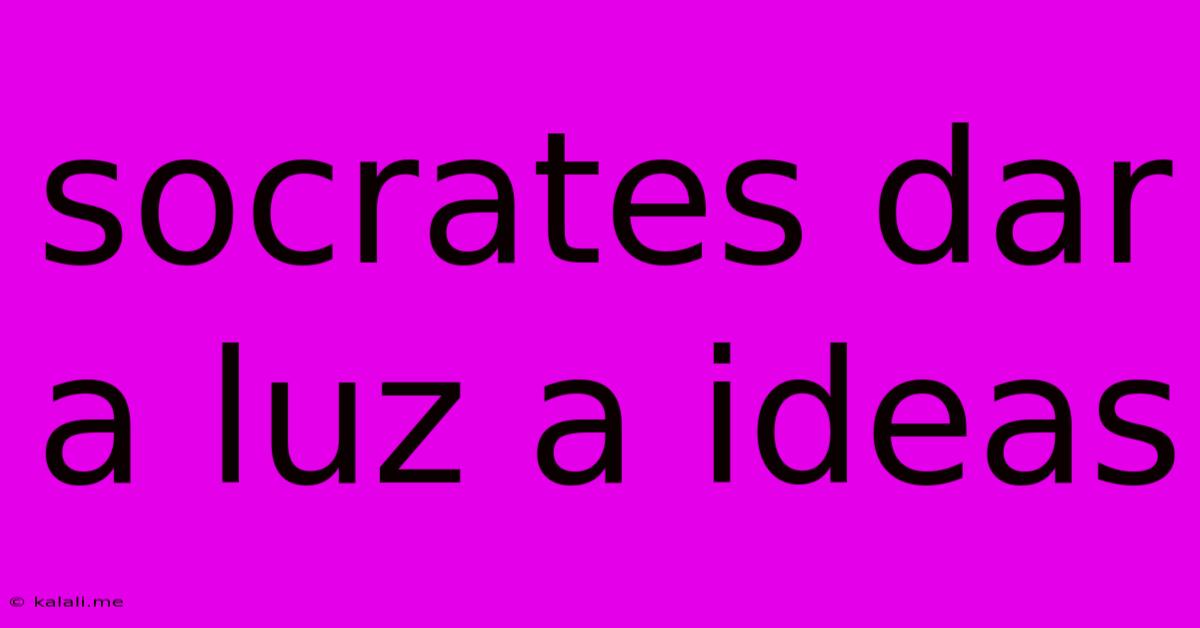Socrates Dar A Luz A Ideas
Kalali
May 31, 2025 · 3 min read

Table of Contents
Socrates: Giving Birth to Ideas Through Critical Inquiry
Socrates, a pivotal figure in ancient Greek philosophy, is famously known for not leaving behind any written works. His enduring legacy rests on the accounts of his students, particularly Plato, who meticulously documented Socrates' method of philosophical inquiry. This article delves into Socrates' unique approach, exploring how he "gave birth to ideas" through a process of relentless questioning and critical examination, leaving a lasting impact on Western thought and the very nature of intellectual discourse. Understanding his method provides valuable insights for modern thinkers and writers alike.
Socrates didn't claim to possess wisdom; rather, he viewed his role as a midwife of ideas, assisting others in delivering their own understanding. This "Socratic method," often characterized by its dialectical nature, involved a series of probing questions designed to challenge assumptions, expose contradictions, and ultimately lead to a clearer, more refined understanding of a concept. He famously declared, "I know that I know nothing," highlighting his commitment to continuous learning and self-examination.
The Socratic Method: A Midwifery of the Mind
The core of Socrates' approach lies in his relentless questioning. He would engage in dialogues, often with those considered wise in their respective fields, posing questions that seemingly exposed gaps in their knowledge. This wasn't done to belittle or humiliate, but rather to stimulate critical thinking and self-awareness. Through a process of elimination and rigorous examination of definitions, contradictions would surface, prompting a reconsideration of initial beliefs. This process, often uncomfortable and challenging, ultimately led to a deeper understanding, a "birth" of new and more refined ideas.
Key elements of the Socratic method include:
- Elenchus: This is the process of cross-examination, using carefully crafted questions to expose inconsistencies and limitations in reasoning. It is a process of relentless probing designed to reveal the truth.
- Aporia: This is the state of perplexity or intellectual uncertainty that often arises during the elenchus. It's a necessary stage in the process, highlighting the limitations of existing knowledge and creating space for new understanding.
- Maieutics: This is the "midwifery" aspect, where Socrates acts as a guide, assisting in the birth of new ideas, rather than imposing his own views. He facilitates the process of self-discovery.
Impact on Philosophy and Beyond
Socrates' influence on Western philosophy is undeniable. His emphasis on critical thinking, self-examination, and the pursuit of truth forms the bedrock of many subsequent philosophical schools. His method continues to be a valuable tool for intellectual inquiry across various disciplines. The Socratic method remains relevant today as a powerful technique for:
- Problem-solving: By systematically breaking down complex problems into smaller, manageable parts, the Socratic method can facilitate innovative solutions.
- Critical evaluation: The ability to identify flaws in reasoning and challenge assumptions is crucial for informed decision-making.
- Improved communication: The careful articulation of arguments and the ability to respond effectively to challenging questions enhance communication skills.
Applying Socratic Principles in Modern Writing
The principles underlying Socrates' method offer invaluable insights for modern content creators. By embracing a questioning mindset, writers can:
- Enhance clarity and precision: Rigorous self-examination of arguments and concepts leads to clearer, more concise writing.
- Strengthen arguments: Identifying potential weaknesses in arguments through self-critique leads to more robust and persuasive pieces.
- Engage readers: Probing questions and a conversational tone can stimulate reader engagement and encourage deeper critical thinking.
Socrates' legacy extends far beyond ancient Greece. His method of intellectual inquiry, a dynamic process of questioning and self-reflection, remains a powerful tool for generating insightful ideas. By understanding and applying the principles of the Socratic method, writers and thinkers can cultivate a more critical, self-aware, and ultimately more productive approach to intellectual pursuits. The "birth of ideas," as Socrates demonstrated, is not a passive process but one requiring active engagement, rigorous examination, and a willingness to embrace intellectual uncertainty.
Latest Posts
Latest Posts
-
How To Get Rid Of M
Jun 02, 2025
-
What Is To The Second Power
Jun 02, 2025
-
South Park Stick Of Truth Investing
Jun 02, 2025
-
Salted Or Unsalted Butter In Fudge
Jun 02, 2025
-
Air Bubbles In Power Steering Fluid
Jun 02, 2025
Related Post
Thank you for visiting our website which covers about Socrates Dar A Luz A Ideas . We hope the information provided has been useful to you. Feel free to contact us if you have any questions or need further assistance. See you next time and don't miss to bookmark.